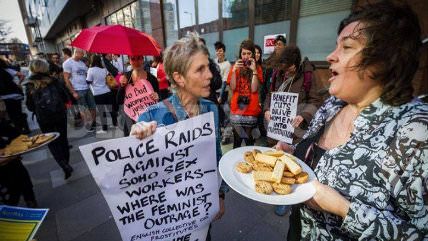Feminist Author Katha Pollitt Advocates Banning Sex Work Because PATRIARCHY

Poet and second-wave feminist darling Katha Pollitt penned a predictably bad piece about sex work for The Nation recently. Pollitt is upset about what she perceives as widespread leftist support for legalized prostitution. This is, in itself, a strange perception—I've followed sex worker activism and attitudes for years, and I am far from alone in noticing a recent surge in anti–sex work passion among progressives. But more problematic/annoying are the reasons Pollitt gives for criminalizing prostitution, reasons which turn on an unsavory belief that restricting liberty is justified if it leads people to better (read: more progressive) views.
Pollitt's opposition seems to hinge mainly on three things:
1) Some people do not want to sell sex and would rather sell pie.
2) Men she knows (and men you know, too!) might visit prostitutes if it's legal.
3) PATRIARCHY.
To the first point, Pollitt notes that it's not "just prudery or fear of arrest or attack or stigma that keeps the vast majority of women working straight jobs. Maybe there's a difference between a blowjob and a slice of pie."
No maybe about it, lady, there is definitely a difference between a blow job and a slice of pie. It's neat that there's room in this world for both, and that there are people willing to both sell and buy both. Waitresses who don't want to sell blow jobs don't have to, sex workers who don't want to bus tables don't have to, and neither of them have to sell insurance. Women who don't want to sell blow jobs or pie or insurance, meanwhile, can find different means of making a livng entirely. The fact that not everybody wants to do a particular job seems like a very silly reason to think that job should be banned.
Would many sex workers choose other work if they could? No doubt. (I'll bet many coal miners and migrant farm laborers would, too.) And sex work supporters acknowledge this. It's completely untrue that popular sex work activists—the kind Pollitt pooh-poohs for having Twitter accounts and a choice in what they do—don't talk about sex worker exploitation. No one is under any illusions that all sex workers are Ashley Dupre or Belle Knox. But, as Noah Berlatsky commented on Pollitt's article, the key question is how best to reduce that exploitation?
"Is it to tell sex workers that there's something wrong with them for doing this work rather than a service job (which does seem to be where your argument leads)?" Bertlatsky asks. "Or is it to try to give them more rights and more power?"
Giving sex workers more rights, however, would also mean giving johns less punishment—a point which Pollitt expects women to find scary. Have you thought about the fact that men you know might visit prostitutes, young ladies? "This faceless man could be anyone: your colleague, your boyfriend, your father, your husband," writes Pollitt. "Theoretically, if it's OK to be a sex worker, it's OK to be a john….Do pro–sex work feminists really think that, though?"
I can't speak for all pro–sex work feminists, but I imagine that most do, in fact, realize that it takes two to tango for money. Which means, yes, it's okay to be a john. Yes, monetized sexual relations with another consenting adult are "OK" no matter which side of the cash flow you're on.
But, but, but…don't we know this will perpetuate patriarchy? "When feminists argue that sex work should be normalized," writes Pollitt, "they accept male privilege they would attack in any other area."
I'm not sure what Pollitt means by "normalized." I've never seen any feminists arguing that prostitution should be the predominant sexual paradigm or that scores more people should go into it. We simply think that prohibition of sex work creates more problems than it solves, that adults should be free to engage in sexual contracts with one another as they see fit, and that driving sex work underground leads to more exploitative conditions for those who are coerced or forced into it. If that's "normalization," sure, but it wouldn't be the first term I'd choose. Semantics aside, the fact that a practice may contribute to troubling gender expectations simply isn't justification to prohibit it.
"Maybe men would be better partners, in bed and out of it, if they couldn't purchase that fantasy," Pollitt notes, as if making men better lovers is good enough reason to lock women away for offering hand jobs. She goes on to worry that destigmatizing prostitution promotes the view "that sex is something women have and men get (do I hear 'rape culture,' anyone?), that men are entitled to sex without attracting a partner."
First, imagine how silly this would sound in any other context (legalizing street vendors promotes the attitude that some people are entitled to soft pretzels without the work of baking them themselves…). Second, men paying women for sex has nothing to do with "rape culture." Rape culture rests on men thinking they're owed or deserve (free) sex from any or all women, not men spending their money to purchase sex from women who have given consent. Regardless, I want no part of promoting certain values—no matter how desirable—through coercive force.
"The current way of seeing sex work is all about liberty—but what about equality?" Pollitt concludes. Liberty, however, is an essential component of equality, and restricting the liberty of those engaged in (buying or selling) sex doesn't get us any closer to a more equal or less sexist society. It just restricts liberty. Hey, at least nobody's dad or husband is visiting a whore without punishment, though, right?


Show Comments (307)